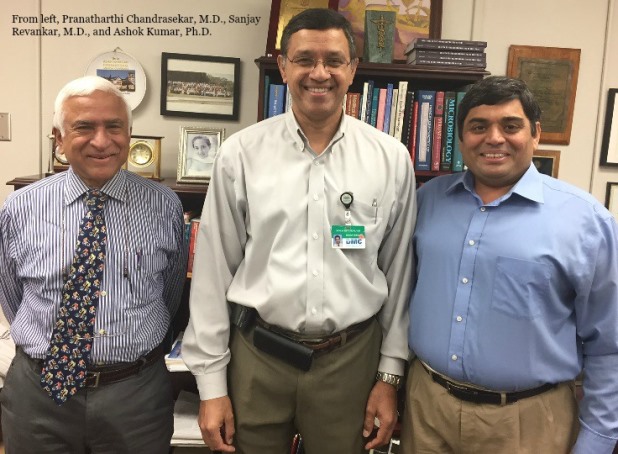
An interdisciplinary research team at the Wayne State University School of Medicine was awarded $77,259 from Northbrook, Ill.-based Astellas Pharma US to test the therapeutic efficacy of Isavuconazole, a new antifungal drug with the trade name Cresemba.
The award proposal was initiated by the research team, which includes principal investigator Ashok Kumar, Ph.D., an assistant professor of Ophthalmology and of Anatomy and Cell Biology, and co-investigators Pranatharthi Chandrasekar, M.D., a professor of Internal Medicine and chief of Infectious Diseases, and Sanjay Revankar, M.D., a professor of Internal Medicine who also directs the School of Medicine's Infectious Diseases fellowship.
The Kumar laboratory studies host-pathogen interactions in microbial infections, including bacterial, fungal and viral, and is investigating the role of innate immunity. Dr. Kumar was previously awarded a R01 grant from the National Institutes of Health's National Eye Institute to reveal the role of toll-like receptors, or TLRs, in bacterial endophthalmitis, a serious complication of ocular surgery and trauma that leads to vision loss in some patients. Endophthalmitis is increasingly recognized as a cause of morbidity and blindness worldwide.
"Although bacteria remain the No. 1 cause of infectious endophthalmitis in more than 90 percent of cases, fungi is considered the second leading cause of ocular fungal infections or ophthalmic mycoses," Dr. Kumar said. "However, the prognosis of fungal endophthalmitis is poor due to frequent delay in diagnosis, reduced availability of therapeutic choices and the immunocompromised status of the host."
The symptoms of ocular manifestations of fungal infections are non-specific, so early detection and proper therapy are important in improving visual outcome and reducing morbidity, he added.
Aspergillus endophthalmitis is a particularly difficult disease to treat.
"We encounter this problem in patients undergoing cancer therapy/stem transplant cell transplant and those with poorly controlled diabetes. We have very limited options today to treat this devastating infection, and often infected patients lose their vision or even life. To our knowledge, Isavuconazole has not been tested for ocular fungal infection, which makes our proposal unique, and we believe it has a promise to cure endophthalmitis," Dr. Chandrasekar said.
The idea for the proposal stemmed from Dr. Kumar's interactions with Dr. Chandrasekar, who invited him to the department's grand rounds, followed by individual meetings. "I truly enjoy the conversation with physicians as they always bring clinical perspectives to the basic research we do in our laboratory," Dr. Kumar said. "Having the interdisciplinary/multidisciplinary research expertise is a win-win situation for the basic researchers and clinicians, and I am fortunate to assemble this team of world-renowned experts on fungal infections. We meet on alternative weeks and discuss new research ideas and assess the progress."
Long-term, the researchers hope to identify metabolic alterations, which could serve as putative biomarkers for diagnosis, diseases progression and/or therapeutic response in fungal infections and can be easily monitored in patients' bio fluids.
"We believe that metabolomic profiling offers an advantage over gene or protein analysis, as small molecule metabolites are the end products of cellular processes in the biological system, including cell, tissue, organ or organism," Dr. Kumar said.
Antifungal drugs available for the treatment of endophthalmitis include amphotericin B, fluconazole and voriconazole.
"Although these drugs are quite effective, they exert significant ocular toxicity and possess limited broad-spectrum activity toward fungal pathogens. In contrast, Isavuconazole has been shown to exhibit broad-spectrum activity against other fungi such as Fusarium and Mucor species, making it an attractive therapeutic for ocular use," Dr. Revankar added.
The investigators thank Department of Ophthalmology Chair Mark Juzych, M.D. '89, and Department of Anatomy and Cell Biology Chair Linda Hazlett, Ph.D., for providing the pilot grant through a Kresge Eye Institute Translational Research and Innovation Grant, and Department of Internal Medicine Chair Basim Dubaybo, M.D., for providing the matching funds.
"Collectively, their support enabled us to develop animal models of fungal endophthalmitis and attract extramural funding from Astellas Pharma," the researchers said.